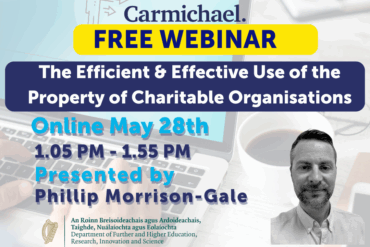With more than 70 episodes, the Carmichael Podcast offers valuable insights into a wide range of topics affecting the nonprofit sector, featuring conversations with leading experts and sector professionals.
Carmichael podcasts are available from most podcast platforms – Acast, Apple, Spotify.
Just click on each title to listen to the podcast.
Episode 81: Denise Charlton: CFI – Delivering impact and making a difference
In this podcast we speak to Denise Charlton CEO of the philanthropic hub Community Foundation Ireland about how it is delivering impact and making a difference for the community it serves.
Click here to listen.
Episode 80: Delivering Impact – Speedpak with John Murphy
In this podcast we speak to John Murphy CEO of the social enterprise Speedpak about how it is delivering impact and making a difference for the community it serves.
Click here to listen.
Episode 79: Good Governance Awards ceremony 2025 – Keynote speeches.
In this podcast we get to hear the keynote speeches at the 2025 GGA event from Fintan O’Toole, Rosemary Keogh and Diarmaid Ó Corrbuí
Click here to listen.
Episode 78: Good Governance Awards ceremony 2025 – Judges speeches.
In this podcast the judges for the 7 categories give their feedback on the shortlisted entries and what stood out for the winners.
Click here to listen.
Episode 77: Designing Best practice board packs for nonprofit boards
We speak to Rea Walshe, governance expert and trainer on the importance of the board pack or board papers and how to design a best practice pack for your board.
Click here to listen.
Episode 76: How to survive and thrive as a first-time board chair
In this podcast we are speaking to Brian Cavanagh, governance expert and a trusted advisor to chairs and chief executives in the public and corporate sectors on the topic of the art of chairing, particularly, for the first time chair.
Click here to listen.
Episode 75: Boardroom realities – what is happening behind the boardroom door?
In this podcast we are speaking to Patrick Downes, a partner with Lionheart Management Consultants and a very experienced governance practitioner, consultant and board member on the topic of the current trends and issues for boards.
Click here to listen.
Episode 74: Regulating charitable organisations in Ireland with Gerry Kearney
In this podcast, our CEO Diarmaid Ó Corrbuí, speaks to Gerry Kearney, Chairperson of the Charities Regulatory Authority about the role of the authority and its supervisory board, the current state of charity regulation in Ireland and Gerry’s vision for the future of the sector.
Click here to listen.
Episode 73: What are the characteristics of an effective board member?
In this podcast were are speaking to Gerry Egan, an experienced governance practitioner, consultant and trainer on the topic of the characteristics and behaviours that make for an effective board member.
Click here to listen.
Episode 72: Protecting your organisation’s reputation, communicating impact and dealing with a crisis.
In this podcast were are speaking to Alan Tyrrell, Senior Managing Director of Teneo, the Global CEO Advisory Firm. The focus of our discussion on this podcast is on three very important items for both the boards and CEOs of third sector organisations, indeed any organisation, reputation, impact and dealing with a crisis.
Click here to listen.
Episode 71:Ensuring your nonprofit organisation is governance compliant.
In this podcast episode, governance specialist Marian Barnard discusses how nonprofits need to regularly assess their compliance with their governance requirements and the approaches they should adopt.
Click here to listen.
Episode 70:Getting ready for SORP.
In this episode Andrea Shupinski, Charities SORP expert discusses the need for charities to plan and to be ready for Charities SORP and the actions that they should be taking now.
Click here to listen.
Episode 69: Regulating by setting standards and helping charities to meet standards.
In this podcast Diarmaid speaks to Madeleine Delaney, the Charities Regulator about the role of the Regulator, the evolving charity landscape and her vision for the sector.
Click here to listen.
Episode 68: Freeing nonprofit CEOs to Lead
In this podcast Darren gives his insights and advice on guiding non-profit CEOs to take their impact to a new level, developing a growth mindset and engaging with philanthropists.
Click here to listen.
Episode 67: Ecclesiastical Ireland; not your typical financial services company
David Lane, Managing Director of Ecclesiastical, Ireland on leading a charity owned financial services company that has ambitious goals for charitable giving and community impact.
Click here to listen.
Episode 66: What is social impact management?
Sandra Velthuis discusses why Impact Management is so important for not-for-profits and how they should go about implementing an impact management culture.
Click here to listen.
Episode 65: The Implications of Migraine in the Workplace
In this podcast, we speak to Pascal Derrien, CEO of the charity the Migraine Association of Ireland. We discuss migraine, an invisible chronic condition, the supports the Migraine Association provide and the challenges of running a small organisation with a national remit.
Click here to listen.
Episode 64: Values led organisation with Niall Crowley
What is a values-led organisation and why are they important? A conversation with Niall Crowley, equality and human rights expert and a co-founder of the Values Lab.
Click here to listen.
Episode 63: GGA 2024 Winners and Judges’ speeches
Judges feedback and the winners of the 2024 Carmichael Good Governance Awards.
Click here to listen.
Episode 62: AI What the Board Needs to Know
In this podcast episode Michael O’Donovan, an experienced board member and strategic leader in technology companies gives his insights on the role that Boards need to be taking to ensure that there is effective governance of AI in their organisations.
Click here to listen.
Episode 61: Complying with company law
A conversation with Fallon Judge, Director of Civil Enforcement with the Corporate Enforcement Authority about the role of the Authority and complying with company law.
Click here to listen.
Episode 60: Dealing with difficult board members
A discussion with Brian Cavanagh, a highly experienced board member and governance consultant where we explore the topic of dealing with difficult and divisive board members. Negatively difficult board members can present a real challenge to the cohesiveness and effectiveness of a board.
Click here to listen.
Episode 59: The role of the Arts in Promoting Human Rights
Mary Moynihan, Artistic Director of Smashing Times International Centre for the Arts and Equality talks about the role of the Centre in connecting citizens to the arts, human rights, climate justice and gender equality, the exciting projects they have been involved in and the Dublin Arts and Human Rights Festival.
Click here to listen.
Episode 58: How to deal with negative conflict and boardroom disputes
In this podcast, Karen Erwin, a solicitor, professional mediator and facilitator, specialising in conflict resolution talks about the steps that should be taken to prevent boardroom conflicts from arising.
Click here to listen.
Episode 57: Nurturing The Next Generation of Social Entrepreneurs
In this podcast, Emer Ní Bhrádaigh, Assistant Professor in Entrepreneurship at DCU, talks about nurturing the next generation of social entrepreneurs and the challenges or barriers that young social entrepreneurs encounter.
Click here to listen.
Episode 56: Effective & Engaged Volunteers with Stuart Garland
In this podcast, Stuart Garland, Learning and Capacity Building Manager with Volunteer Ireland talks about the state of volunteering, what nonprofits can do to be better at attracting and retaining volunteers and have more effective and engaged volunteers.
Click here to listen.
Episode 55: Good Governance Awards 2023 Judges speeches
In this podcast, the winners of the 2023 Good Governance Awards are announced and the chairs of the judging panels give their feedback on the shortlisted entries and what made the category winners stand out. Excellent tips on what makes for a great annual report.
Click here to listen.
To enter the Good Governance Awards 2024 click here.
Episode 54: The Digital Transformation of Nonprofits
Sylvester Murphy, CEO of Enclude talks about the digital transformation of service delivery by nonprofits and why the effective and innovative use of technology should be on the radar of every nonprofit board.
Click here to listen.
Episode 53: The Art of Chairing a Board
In this episode Diarmaid speaks with Bernie Gray, a very experienced board member and board chair who gives her insights on being an effective chair, managing key relationships, boardroom dynamics and dealing with an underperforming board member.
Click here to listen.
Episode 52: Pro Bono Legal Supports for Non-profits
Diarmaid speaks to Carolann Minnock Of Counsel at Arthur Cox who leads the pro bono practice there, about her career to date and pro bono legal supports for nonprofits.
Click here to listen.
Episode 51: How to successfully recruit Charity Trustees with Rea Walshe.
On our ever growing in size and popularity show – Diarmaid speaks with Rea Walshe, interim CEO of Boardmatch Ireland, about her career journey so far and how to successfully recruit charity trustees.
Click here to listen.
Episode 50: A Conversation with the Charity Regulator, Helen Martin.
On our 50th Podcast release we are delighted to welcome Helen Martin, the charities’ regulator, to discuss the ever changing landscape of the charity sector. She shares both her career journey and her vision for the charities landscape.
Click here to listen.
Episode 49: The evolving landscape in the charity sector with Aine Myler
Diarmaid invites Aine Myler, CEO of Charities Institute of Ireland , to chat about her career journey and the evolving landscape that is developing in the realm of Charities.
Click here to listen.
Episode 48: Sustainability in the charity and non-profit sector
An interesting discussion where Niall Fitzgerald of Charters Accountant Ireland joins our CEO Diarmaid to discuss sustainability reworking and its effects on the non-profit sector.
Click here to listen.
Episode 47: Finding and Onboarding the Right Board Members
It is very important to know what kind of person you need and want on your Board – their skillset and their attributes impact on the strength of your board. In our 47th podcast, Roisin McGuigan, Services Manager of Carmichael, joins Diarmaid, our CEO, to share her knowledge of recruiting the most suitable board members for your organisation.
Click here to listen.
Episode 46: Scaling Social Enterprise with Clodagh o Reilly
Diarmaid Ó Corrbuí invites Clodagh O Reilly to share her career development story and how she developed a career in social enterprise. She shares her views on scaling social enterprise.
Click here to listen.
Episode 45: The Power of Story Telling with Martina Quinn of Alice PR
Carmichael CEO Diarmaid Ó Corrbuí sits with Martina Quinn from Alice PR to discuss the power of story telling and how you can empower your organisation by knowing how to share the organisation’s story.
Click here to listen.
Episode 44: The Role of Pobal in supporting Community and Voluntary Services in the last 30 years.
Anna Shakespeare (CEO of Pobal) meets our CEO, Diarmaid Ó Corrbuí to discuss how Pobal has supported the community and voluntary services over the last 30 years.
Click here to listen.
Episode 43: A vision for the sector and The Wheel from Ivan Cooper its new CEO.
Ivan Cooper joins Diarmaid Ó Corrbuí to talk about the vision for the sector and The Wheel.
Click here to listen.
Episode 42: 50 years of Coolmine with Pauline McKeown
A topic that may be close to the heart. Pauline McKeown joins Diarmaid Ó Corrbuí discussing how Coolmine has grown over 50 years, sharing experiences, and the types of supports offered by Coolmine.
Click here to listen.
Episode 41: Environment, Social and Governance with Rhea Albuquerque
Rhea Albuquerque from the Corporate Governance Institute, speaks with Diarmaid about how Environmental, Social and Governance elements work alongside each other in organisations, for example more and more it comes up on the board agenda.
Click here to listen.
Episode 40: The Future of the Boardroom with Mark Wilson
Have you ever wondered about the future of your Boardroom? Let’s find out what to expect with BoardEffect’s Mark Wilson joining our CEO Diarmaid Ó Corrbuí.
Click here to listen.
Episode 39: Cyber Security with Eoghan Daly
Our CEO, Diarmaid Ó Corrbuí talks with Eoghan Daly, a director in BDO, about the key questions that every board member and leader should ask around the subject of Cyber Security in their organisation.
Click here to listen.
Episode 38: The Leadership Academy with Sharon Hughes
Sharon Hughes, manager of the Leadership Academy, joins Diarmaid Ó Corrbuí to discuss what leadership is and how you can enhance your leadership skills using the right resources.
Click here to listen.
Episode 37: The Art of Networking with Kingsley Aikens
“It’s not about the what, it’s not about the how, it is about the who.”
Kingsley Aikens educates us on the Art of Networking through a very informative discussion with our CEO Diarmaid Ó Corrbuí.
Click here to listen.
Read Top 50 Networking Tips from The Networking Institute here.
Episode 36: Succession Planning with David Duffy
David Duffy, co-founder and CEO of the Corporate Governance Institute, joins Diarmaid Ó Corrbuí to dissect the area of Succession Planning and its importance for Board Governance.
Click here to listen.
Episode 35: Diversity, Equality and Inclusion.
Liz Hughes speaks with our CEO Diarmaid Ó Corrbuí on the subject of Diversity & Inclusion with the goal to get people thinking about it in their organisations and also, encouraging these organisations to start the conversation on this very subject.
Click here to listen.
Episode 34: Anti-Money Laundering with Marian Barnard
Marian Barnard joins our CEO, Diarmaid Ó Corrbuí, in a discussion on all things Anti Money Laundering and how it can play its role in the non profit sector.
Click here to listen.
Episode 33: How to Get the Best from PowerPoint Presentations
In conversation with our CEO, Diarmaid Ó Corrbuí, Fiona Walsh shares how to make your PowerPoint slides more engaging, allowing you to get more from your presentation. Listen here.
Episode 32: What Makes a Good Board Meeting
Whether it is a new board, or a board that is up and running, or where there are issues running through a board, Gerry Egan talks here with our CEO Diarmaid Ó Corrbuí about how you can get the most out of a board meeting.
Episode 31: 2022 Good Governance Awards – Part Two, Announcing the Winners
It was a great evening and well done to all the winners in their various categories. Have a listen here to the announcement of the winners.
Episode 30: 2022 Good Governance Awards – Part One, Opening Speeches
Have a listen to here to the opening speeches of our very successful 2022 Good Governance Awards Ceremony.
Episode 29: Boards behaving Badly and Domineering CEOs
Fortunately, most boards and CEOs in the charity sector have positive working relationships. However, when things go wrong, they can go badly wrong. In this podcast, we explore what to do when they do and how to prevent them from going wrong.
Click here to listen
Episode 28: Thrive in the future of work: A conversation with author, Kevin Empey
In this podcast we speak to organisational change specialist and author Kevin Empey about the key trends in the world of work, the key challenges for the individual and for the organisation and what should individuals and organisations be doing to be ready and to adapt to these challenges.
Click here to listen.
Episode 27: Evaluating the Effectiveness of your Board
In this podcast Andrew Madden (Learning & Development Manager at Carmichael) and Diarmaid Ó Corrbuí (CEO of Carmichael) look at Board evaluations, why they are important for good governance, board effectiveness and succession planning, the different types of evaluations and how to conduct them.
Episode 26: The Role of Company Secretary
Colm Hanley explains the key roles and responsibilities of the company secretary and explores the growing importance of the company secretary in ensuring that organisation’s compliance with the governance code and regulatory requirements.
Click here to listen.
Episode 25: Governing with Purpose
In our latest podcast episode, Carmichael CEO, Diarmaid Ó Corrbuí, interviews Brian Cavanagh, a business coach and governance specialist, who will have his book “Governing with Purpose” published in September.
Click here to listen.
Episode 24: Cyber Security with Liam Lynch
Cyber security is a growing risk for all organisations which can have devastating consequences. In our latest Carmichael podcast, we talk to cyber security expert Liam Lynch about what board members and managers of nonprofits should be doing to manage this risk.
Click here to listen.
Episode 23: Financial Oversight Responsibility for Boards Members
In our latest podcast episode, Carmichael CEO, Diarmaid Ó Corrbuí discusses with charity finance expert, Andrea Shupinski the important responsibility for board member in providing financial oversight and what that entails.
Click here to listen.
In the latest Carmichael podcast we speak with Liam Scollan about community and voluntary organisations being “Ready and Able” for the emerging post Covid pandemic environment responding to the challenges, opportunities and innovations they are encountering.
Click here to listen.
Episode 21: When a Charity Inspector Calls
In this podcast, Carmichael’s Training Manager, Derek O’Reilly, interviews Diarmaid Ó Corrbuí, CEO, about the findings and the wider sector implications of the Charity Inspector’s Report into Child Fund Ireland.
Episode 20: Chris Gordon Talks On the Evolving Landscape for Social Enterprises
Carmichael CEO, Diarmaid Ó Corrbuí, talks with Chris Gordon, CEO of the Irish Social Enterprise Network, on the evolving landscape for social enterprises, opportunities and challenges.
Click here to listen.
Episode 19: Board recruitment is an ongoing requirement even during a pandemic
We talk to Eva Gurn, CEO of Boardmatch Ireland, and the valuable role they play in matching those volunteering for board roles and non-profits looking to recruit board members.
Have a listen here.
Episode 18: Three more charities rising to the Covid-19 challenge to continue delivering their supports and services
Diarmaid in conversation with three more charities based at the Carmichael Centre, about their challenges during the Covid-19 crisis. Firstly we hear from Heart Children Ireland, then The Prader Willi Syndrome Association and finally Dyspraxia DCD Ireland.
Have a listen here.
Episode 17: Creativity, Culture, Collaboration and Courage by CRC staff in response to Covid-19
Diarmaid talks with Stephanie Manahan, CEO of The Central Remedial Clinic, CRC.
Have a listen here.
Episode 16: Coping with Covid-19 – The challenge for small charities as they provide much needed services
In episode 16, we speak with 3 small charities, Look Good Feel Better, FirstLight and Huntington’s Disease Association of Ireland about their Covid-19 challenges and how they are responding to maintain services to their clients.
Listen here.
Episode 15: Michael Wickham Moriarty gives insights to Trócaire’s award winning governance culture
In conversation with Michael Wickham Moriarty, the head of Corporate Services at Trócaire. Michael gives us an insight into Trócaire’s award winning governance culture and talks about how Trócaire is coping with Covid-19. Have a listen here.
Episode 14: Leveraging Technology for Social Good
Diarmaid’s guest is Eamon Stack, the outgoing CEO of Enclude. They discuss how best to use technology for social good. Have a listen here.
Episode 13: Creating an Ethical Culture in Organisations
In episode 13, Niall Fitzgerald, Head of Ethics and Governance at Chartered Accountants Ireland joins Diarmaid Ó Corrbuí, CEO of Carmichael Ireland to discuss how to create an ethical culture in organisations. Have a listen here.
Episode 12: What Makes a Good Annual Report Great
Diarmaid Ó Corrbuí, Carmichael CEO in conversation with Aedín Morkan, partner with Mazars’ Audit Assurance Group about making a good Annual Report even better. Listen here.
Episode 11: Developments, Opportunities and Challenges for charities
Talk with Liz Hughes CEO of Cii on ‘Developments, opportunities and challenges for charities’. Have a listen here.
Episode 10: “G.D.P.R., it hasn’t gone away”
In episode 10, we talked with Gerry Egan on “G.D.P.R., it hasn’t gone away you know”. Have a listen here.
Episode 9: “What’s Happening with Volunteering in Ireland?”
Diarmaid Ó Corrbuí, Carmichael CEO talks with Nina Arwitz CEO of Volunteer Ireland on “What’s happening with volunteering in Ireland?”. Episode 9 is available here.
Diarmaid Ó Corrbuí, Carmichael CEO talks with Deirdre Garvey, CEO of The Wheel about her work and the challenges which face the Charity and Voluntary Sector as Election 2020 draws nearer. Episode 8 is available here.
Episode 7: 2019 Good Governance Awards The Winners
Recording of the Winners of the 2019 Good Governance Awards here.
Episode 6: 2019 Good Governance Awards Keynote Speech
Louise Thomson’s 2019 Good Governance Awards keynote speech is available here.
Episode 5: Board ethics and behaviour
In episode 5, Diarmaid Ó Corrbuí, Carmichael CEO, interviews Louise Thomson, Head of Policy for ICSA: The Governance Institute about Board ethics and behaviour. Listen to the full podcast here.
Episode 4: When Things Go Wrong in Charities
We really enjoyed talking to Jillian van Turnhout in our latest Carmichael podcast on the topic of ‘When Things go wrong in Charities’. This episode follows on from previous topics which looked at the Annual Report, the Charities Governance Code and Risk Management. Here’s link to this episode.
Episode 3: Risk and Risk Management
CEO, Diarmaid Ó Corrbuí and Training Officer, Andrew Madden discuss risk and risk management for non-profit organisations. Listen here.
Episode 2: The Charities Governance Code
Diarmaid Ó Corrbuí, CEO, and Derek O’Reilly Training Manager, Carmichael, in conversation about the Charities Governance Code. This conversation provides practical insights into the Code and how to go about the compliance process. It touches on the challenges and pitfalls, as well as resources, supports and key dates to ensure full compliance by 2021. See full details of the Code by listening here.
Episode 1: Why is using your annual report to tell your story important for nonprofits?
Derek O’Reilly, Training Manager and Diarmaid Ó Corrbuí, CEO of Carmichael, in conversation about annual reports for nonprofits. This conversation provides practical insights in what to consider when writing an annual report, including: your organisation’s purpose; strategy; risk management; financial management and outcomes. It also touches on the Good Governance Awards, and the opportunity they provide to access resources and high quality feedback on your annual reports. See full details on https://goodgovernanceawards.ie/. Click here to listen.
In accordance with their fiduciary duties to the organisation, board members have a responsibility to implement good governance. The board is expected to operate collegially. Each board member brings to the boardroom their own particular skills, knowledge and experience, and has a duty to apply their skills, knowledge and experience, acting at all times in the best interests of the organisation.
An effective board seeks to stimulate the flow of ideas, identify key issues, consider alternatives and make informed decisions. To do so requires often-vigorous debate, which can sometimes turn into negative conflict. There are many more issues and situations outlined in section 2 below that can give rise to a board dispute. Such disputes must be dealt with as soon as possible, because if left unresolved,
they can undermine the board’s effectiveness and the organisation’s performance.
To set out the process for the removal of a board member from a board for nonprofit organisations.
This policy guide outlines the internal processes and best practice steps to be taken. It complements existing legal provisions for board member removal under the Companies Act 2014. If there is any conflict between this guidance document and the organisation’s constitution or relevant legislation, the constitution and/or the law will take precedence.
Before, applying the policy in an actual board member removal situation, the board should consider if it should obtain professional advice on the specific nature of the dispute and application of the procedures in the policy, particularly, if steps 1 (informal resolution) and 2 (mediation) below fail to have the matter resolved.
AI is rapidly evolving and its use in the nonprofit sector presents concerns, challenges and opportunities. As part of their ‘Consulting with NGOs’ module run by Kathleen O’Reilly, a team of UCD students were teamed up with Carmichael to address these questions.
The students conducted research to assess both the current applications of AI in nonprofit organizations and the potential opportunities for its integration.
This document is an overview of their work and summarises their findings on AI usage in the sector, ethical considerations and barriers, guidelines for using prompts and key recommendations for using AI.
The background literature review which gives further context to this summary document will be released in the coming months.
Thank you to Giovanni Morandi, Vivian Li, Colin Cunningham, Nathan Souillard, Sorcha Love & Gavin Maggio for this useful piece of work.
Each year, nonprofit organisations dedicate extensive time and energy to producing their annual reports. The Annual Report is the perfect medium to showcase your strategy and operations, and also to signpost your future direction.
Below is an exploration of its core utilities and how organisations can unlock their full potential.
Thank you to Sheena Horgan from 2into3 for her contribution.
Good Governance Awards 2024 Technical Assessment of the Financial Statements.
The Carmichael Good Governance Awards consists of a three-staged process to identify the winners in each of the categories; a general assessment stage, a technical assessment of financial statements of those entries that have been longlisted in the general assessment and a judging stage of the shortlisted entries to select the category winners. The technical assessment is conducted by our panel of accounting firms who assess the compliance of the financial statements with relevant legal and accounting standard requirements. This information resource is a list of the compliance issues identified by our Technical Assessors in the 2024 Good Governance Awards.
On the 27th of February 2024, Carmichael hosted a webinar on how nonprofits can improve their annual reports and financial statements.
The panel consisted of:
- Nina Arwitz: CEO of Volunteer Ireland
- Aedín Morkan: Audit Partner at Mazars Ireland
- Senan Turnbull: Consultant and trainer specialising in nonprofit annual reports
The panel was chaired by Róisín McGuigan: Services Manager at Carmichael and Coordinator of the Good Governance Awards.
The three panellists shared some of their pointers for improvement and the session finished with a Q&A.
This resource is taken from the session.
Board packs are one of the key gateways for board members into the organisation they govern. The clarity and accessibility of board packs is vital to ensuring an effective board and well-governed organisation.
Follow the four stage plan to achieve this.
This article explores the use of performance metrics by boards and the process for selecting and
assessing key performance indicators. It is an extract from a Carmichael report “Improving the quality of
board packs for better decision making in Irish Nonprofits”.
We all know that the annual report is more than just a profit and loss statement. Annual reports are typically filled with important and often critical information about the charity’s finances, its performance, and its goals for the future so make sure it is accessible. Have a read of this resource to guide you.




